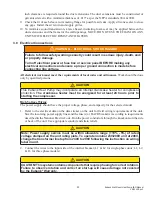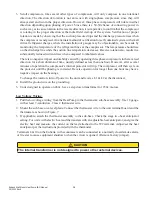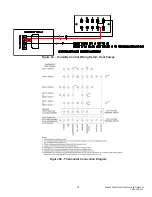
24
Eubank Wall Mount Heat Pump I&O Manual
05/2023 Rev.2
set on the control board for setting 7 in the configuration menu. The outdoor fan will speed up
and slow down between liquid line temperature of 80F and 115F. Systems with (PSC Outdoor
Motors) utilizes a Fan Cycle Switch which closes at 400 PSIG to energize the OFR (outdoor fan
relay) to start the outdoor fan which runs until the switch reopens (at 290 PSIG). These outputs
function as described until the Dehumidification setpoint is satisfied. This is considered as ON/
OFF fan cycle control and the PSC motor will not modulate.
Note:
A request for Y1 or Y2 vis digital input or Modbus takes priority over dehumidification
operation and the hot gas reheat valve will de-energize.
5.2 Electric Reheat (if equipped) –
When there is a request for “Dehumidification” (HUM-signal
via Digital input or Modbus), this will result in the control board energizing the Indoor Fan
(IBR), Compressor 1 (CC1), Compressor 2 (CC2), Reversing Valve (RV) “heat pumps only”
and the Reheat (RH) relay outputs on the board. This forces the system to operate in the full
capacity cooling mode while energizing the electric heat to allow heat to be introduced into
the supply air stream of the system for dehumidification operation. The indoor fan motor will
operate at the “Dehum” speed setting on the board or via Modbus. The indoor fan remains on
continuously but the outdoor fan modulates based on liquid line temperature. The Fan Cycle
Control Sensor (Low Ambient Control Sensor) monitors the liquid line to maintain a 90F liquid
line temperature. When the liquid line temperature is below 80F the outdoor fan will shut off. A
liquid line temperature above 115F will force the outdoor fan to operate at the maximum speed
set on the control board for setting 7 in the configuration menu. The outdoor fan will speed up
and slow down between liquid line temperature of 80F and 115F. Systems with (PSC Outdoor
Motors) utilizes a Fan Cycle Switch which closes at 400 PSIG to energize the OFR (outdoor fan
relay) to start the outdoor fan which runs until the switch reopens (at 290 PSIG). These outputs
function as described until the Dehumidification setpoint is satisfied. This is considered as ON/
OFF fan cycle control and the PSC motor will not modulate.
Note:
A request for Y1 or Y2 vis digital input or Modbus takes priority over dehumidification
operation and the electric heat will de-energize.
6.0 Refrigeration Protection
6.1 High Pressure Lockout –
This condition describes the abnormal rise in Head Pressure within
system with an acceptable limit of 660 PSI (+/-20PSI). The fault will only be active when
the High-Pressure Switch (Normally Closed) opens during a request for Cooling or Heat
Pump Heating. The first time this fault condition occurs, the system cuts the compressor off
WITHOUT locking out. Once the pressure normalizes (drops below 450 PSI), the system will
resume operation if the cooling or heat pump heating call still exist. If this fault occurs a second
time on the same Cooling or Heat pump heating request, the system locks out. Lockouts can
be monitored using the control board display for the current fault. The fault for a high-pressure
lockout will displayed as “HP-1” or “HP-2” followed by “F”. The faults can also be monitored
via Modbus by reading the respective value based on the Modbus map that is provided. After
this lockout condition is reached, the cooling/heat pump heating call must be cycled (on/off of
respective request) or the system must be power cycled to clear the fault. For a 2-compressor
system, each lockout is isolated to the respective circuit and will not interfere with the operation
of the other circuit providing that the circuits operate independently. The system will continue
to lockout until the problem is rectified.
6.2 Low Pressure Lockout / Freeze Protection –
A10K Nominal NTC Thermistor is connected
to the “LPS 1” and “LPS2” inputs of the control board for circuit 1 and circuit 2 respectively.
















































